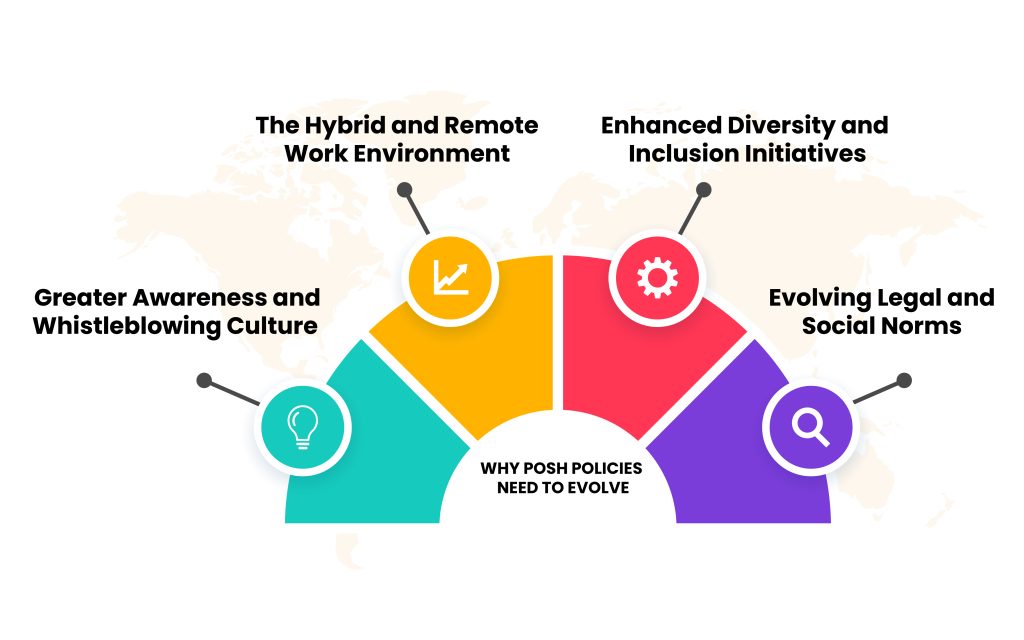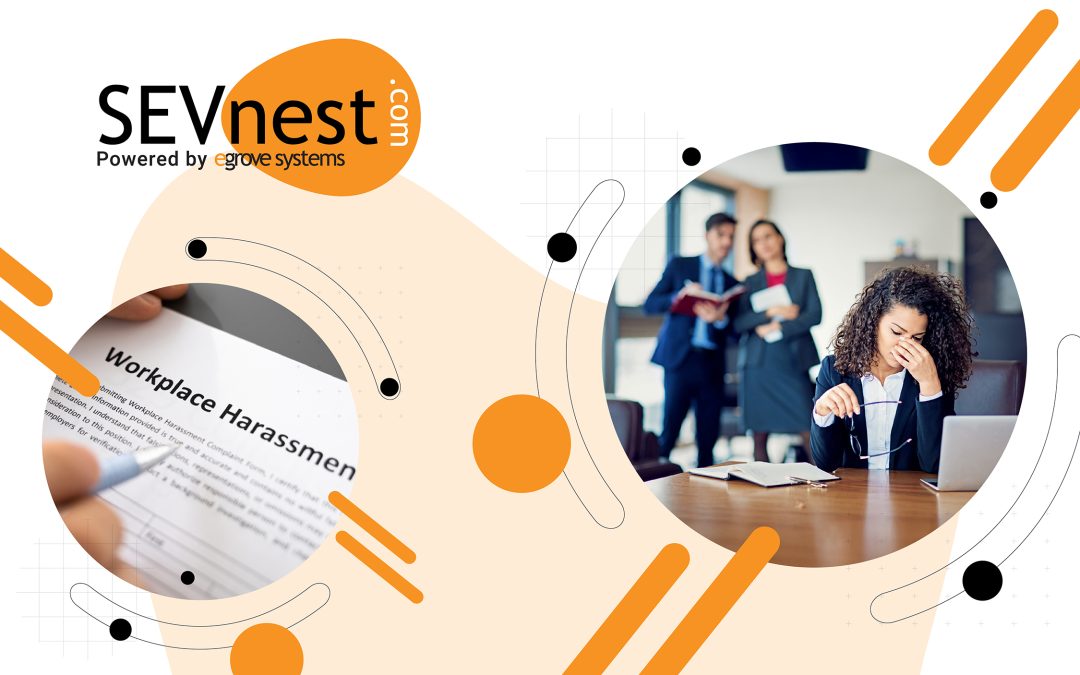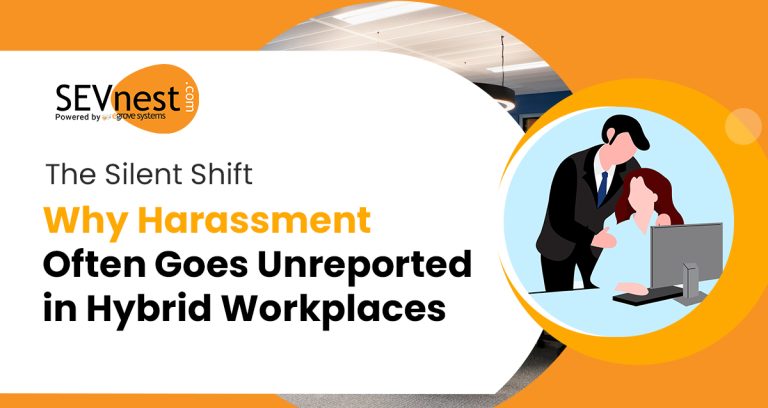The idea of workplace safety is increasingly extending beyond physical safety. Over the last 10 years, psychological and emotional safety, specifically as it pertains to harassment prevention, has become a key aspect of organizational health and adherence. As we approach 2026, the work culture, online interactions, hybrid work arrangements, and changing interpretations of the law are changing the manner in which organizations view and implement their POSH policies. These guidelines are evolving. Is your organization ready for 2026’s advancements?
Understanding POSH

The Prevention of Sexual Harassment (POSH) Act of 2013 was created to safeguard workers, mainly women, from facing sexual harassment while at work. The law requires all organizations with 10 or more employees to:
- Establish an Internal Committee (IC) to receive and address complaints.
- Conduct regular awareness and sensitization programs.
- Display the organization’s POSH policy clearly and publicly.
The POSH Act gives all employees the ability to make a report about inappropriate behavior without fear of victimization, and ensures that any investigation process is conducted thoroughly and in an equitable manner.
Why POSH Policies Need to Evolve
 Work cultures, models, and environments are changing, as are employee expectations. These policies must evolve for the following reasons:
Work cultures, models, and environments are changing, as are employee expectations. These policies must evolve for the following reasons:
-
The Hybrid and Remote Work Environment
Workplace interaction is no longer limited to physical offices. Virtual meetings, team chats, and other online collaboration tools have removed limitations of language and provided new formats.
An inappropriate act can now take place in an individual’s chat room, in an unsolicited message to someone, or in video camera behavior. But many organizations have not yet adapted their policies to include specific comments on misconduct in the digital space.
-
Enhanced Diversity and Inclusion Initiatives
Today’s workplaces are the most diverse they have ever been. A universal POSH framework may not protect every employee. Policies should include language that acknowledges harassment from all genders while also protecting contract workers and interns.
-
Evolving Legal and Social Norms
Regulators have a more cautious view of breaches in POSH compliance. If an internal committee is not appointed or training is not scheduled regularly, organizations are subject to financial penalties and reputational harm.
-
Greater Awareness and Whistleblowing Culture
Due to social media’s proliferation, employees are now more aware of their rights and hesitate less in speaking out in the workplace. This improves safety at work but means that an organization must also have meeting procedures in place to handle complaints professionally and promptly in connection with the policy.
What Makes A Future-Ready POSH Policy

As 2026 comes closer, organizations need to review their current policies and practices, with a view to assessing compliance with emerging realities. Ideally, a future-oriented POSH policy should include:
-
Expansive Definitions
Your policy should include online, hybrid, third-party, interns, and consultants. Harassment should be described in expansive terms, accounting for both physical and digital behaviors.
-
Inclusive Representation and Language
Make sure you’re replacing all gendered pronouns with inclusive language. Ensure that the Internal Committee also has inclusion training to ensure representation of diverse and/or multiple genders.
-
Regular, Meaningful Training
POSH training should never be a one-and-done, compliance-based activity. It needs to be trained by case-based learning and scenarios, so participants understand real-life situations better and respond to real-life situations more appropriately.
-
Digital Reporting and Confidentiality
Consider introducing a secure, anonymous digital system for employees to report issues. Train IC members to maintain confidentiality and in a respectful manner.
-
Regular Audit Policies and Laws
Consider requiring an annual audit of the POSH policy. Policy should remain in line with new laws, guidelines, and realities in the workplace, and it’s worth considering an annual review as the structure of your workforce changes, especially in hybrid or non-local circumstances.
-
Proactive Leadership
Leaders establish the tone for behavior in the workplace. When top management utilizes its voice, time, and resources to advance awareness efforts, it reinforces your organization’s values.
Creating a Culture Beyond Doing the Right Thing
A POSH-compliant organization instills trust, respect, and empathy. Following the rules serves as the foundation, but real impact happens in organizational culture. To make a sustainable and nurturing culture at the workplace, organizations must make conversations about behavior in the workplace normal through open discussions, forums, and workshops. Documenting to see how common it is has a big impact.
They should also train managers on the early signs and red flag behaviors of harassment or discomfort. Exemplifying ethical behavior helps build a positive culture. Additionally, it is important to embed POSH principles into the performance review process and into the leadership training to ensure rightful application.
How Organizations Can Prepare for 2026

The next wave of compliance is expected to move away from reactive enforcement actions. It is essential for organizations to prepare for what is expected to happen through the following measures:
- Audit your existing POSH Framework. Look for gaps you can address in your IC structure, training frequency, reporting style, or methods.
- Employ technology to carry out assessments and establish means of communicating. You can also use e-Learning modules, AI-inspired Learning tools, or complaint management systems with secure reporting to assist with oversight, awareness, and compliance reporting.
- Train IC members on hybrid harassment, investigations without bias, and trauma-informed inquiry methods.
- For organizations that are multinational companies, it is important to check that they align their organization’s POSH policy with global workplace safety laws for international compliance.
Simplifying the Integration of POSH With SEVnest
Preparing to stay in compliance with the constantly changing POSH regulations requires expertise. At SEVnest, our POSH training programs are built for organizations that want to be legally compliant, culturally competent, and forward-thinking. We focus on scenarios related to practice, current law, and hybrid workplaces, and engage teams to work toward creating a safe and respectful environment.
Conclusion
As the workplace culture continues to change, so should the frameworks to keep it safe. POSH compliance is about more than just avoiding legal consequences; it is about creating empathetic, equitable, and empowering workplaces. As you strengthen your policies, empower your internal committees, and build trainers to go into your culture of awareness, you are building not only a compliant organization but one people trust and want to work in.







